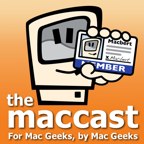Written by: Adam Christianson
Categories: Maccast Members, Podcast
A podcast about all things Macintosh. For Mac geeks, by Mac geeks. Episode 085. OS X Lion is coming soon and while it brings many new features and enhancements there are some technologies that are also going away. Rosetta is no longer supported in Lion, so in this episode I cover how to tell if you have any left over Power PC apps that require Rosetta and offer options for what to do if you need to keep those apps running.
Maccast Members
The audio for this episode is available to Maccast Members. Sign-up or log in by visiting the Maccast Member site.






Really? What are all these Rosetta apps that I’m missing out on? Examples?
There aren’t a bunch, but you may be surprised too. The two big ones that seem to be coming up are Quicken 2007 and Office 2004. Also Photoshop CS1. Yes they are very old versions, but they also are very costly and unless you had a compelling reason to upgrade maybe you didn’t. There are also those little utility apps that you’ve come to rely on that still work, but the developer has possibly stopped updating. I found Cardiris 3.6 for ScanSnap which I use to process business cards after a trade show and a utility called Pic2Icon. They are small things and I don’t use them everyday, but now I can look for alternatives before I need them not when I go to use them only to discover they no longer work.
yeah, it is a problem. My last holdout is 4th Dimension. I have one old database for a client that needs to be maintained. There’s not only the cost of a software upgrade but also the cost of tinkering around with a custom app to get it to run the way you would like on the current version … I will probably just run it on an old Mac where it is happy. It is inconvenient to have to run a separate computer for just one program..
One workaround that Apple has ruled out is to virtualize an old copy of Mac OS X — instead of dual booting or (UGH) buying a Windows version of the same app and virtualizing Windows (talk about desperation). I can see why they don’t allow virtualizing the Mac OS X on non-Apple hardware, but the reason for not permitting virtualization on Apple-branded computers is not clear at all to me. This is a great reason for doing so…
As i found out you could get hold of a copy of OS X server 10.4/10.5/10.6 and run it on parallels for rosette programs (if they will run on the server version ?) – i say this but i have not tested it on 10.7, just on 10.6 ( running OS X server 10.5 through parallels on a 10.6 machine) maybe this is an option for some people ?…
Adobe CS2 (2005/6) programs are also Power PC/ rosette programs